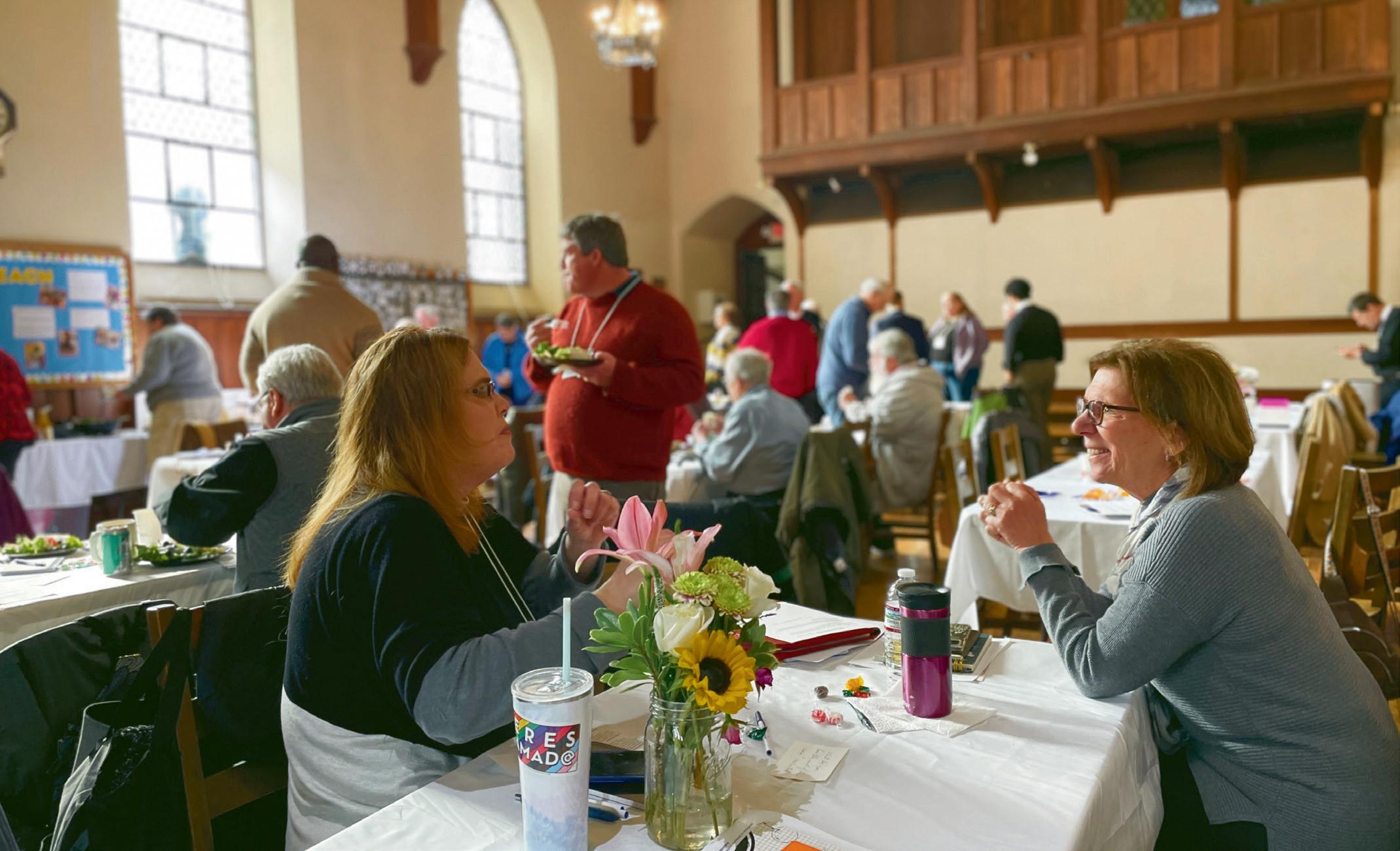
5 minute read
Forward in Hope: Worcester Corridor Mission Planning
Forward in Hope: Worcester Corridor Mission Planning
The Rev. Vicki Ix, Managing Editor, ABUNDANT Times
It was a new thing, this gathering of wardens and clergy in the Worcester County corridor. Diocesan gatherings, in general, tend to be all-inclusive like Convention, Bending Toward Justice, or Parish Leadership Day (remember that?). However, our work on Saturday, February 22, was particular. The Worcester Corridor has a rooted, vibrant, faithful ministry and the Worcester Corridor currently has more clergy vacancies than the other two corridors combined.
This is a good place to stop for a moment and acknowledge that every clergy vacancy is important. The Rev. Steven Wilco, Canon to the Ordinary and Transition Officer, curates a working document reviewed each week by the Bishop and canons to check status on every single vacancy. It is of utmost concern and we trust that the Spirit is at work.
On February 22, Bishop Fisher reminded us that the clergy shortage is everywhere in The Episcopal Church. “The Baby Boomers are all retiring or going to God.” The massive exodus from active ministry is generational but also impacted by the pandemic. The most recent Parochial Report data (2023) indicates that clergy leadership is among the top five challenges congregations are facing. “Churches describe leadership transitions and challenges, such as the absence of full-time clergy, reliance on visiting priests or lay leadership, the need for leadership training to sustain church operations, and new leadership hierarchies regarding sharing roles and responsibilities.”* This challenge in ongoing, ubiquitous, and it has come home to Western Massachusetts.
The Worcester Corridor Mission Planning event on February 22 was a new effort to meet this challenge head-on with faith, curiosity, and creativity. Clergy, wardens, and vestry leaders met at All Saints Episcopal Church in Worcester to pray, to listen to one another, and to wonder how congregations might collaborate in new ways in this difficult season. Grounded by Morning Prayer in All Saints’ magnificent chancel, we moved to the parish hall where Bishop Fisher set the tone for our day with an overview of the transition challenge. He located it within the larger challenges we face in our society. The shortage of Episcopal priests mirrors the shortage of doctors, nurses, plumbers, etc. All professions are seeing Baby Boomers retire and the trickle-down impact changes our access to healthcare, how long it takes to build, renovate, or make repairs. In living communities of faith, mission cannot wait for the next rector or priest-in-charge. It was with this urgency in mind that the idea to gather the Worcester churches emerged.
The Bishop was clear, too, that the day was not about making big decisions. The purpose of the gathering was to deepen relationships and imagine possibilities. “Every church in the corridor is invited today – this isn’t about how to help struggling churches, how to merge/close congregations or sell buildings – this is about how we can be better together as the Episcopal branch of the Jesus movement; every ministry here today has things to offer and things to learn.” The Bishop turned the program over to Canon Wilco who invited our theological reflection on the practice of ministry.
1. What makes your heart sing? 2. What is draining your energy? 3. Where do you see God?
Common themes emerged, especially with regard to what drains energy in congregations. Finances, physical plant, unknown future, clergy transition, aging community, leaders wearing too many hats – these elicited nodding heads and sympathetic smiles, but the really good stuff came from the other two prompts. Even amid these real and serious concerns, the Jesus Movement is alive and engaging God’s people.

There are pre-schools, food pantries and refrigerators feeding the hungry, and an indispensable diaper ministry. People are volunteering again and the post-pandemic purpose of the Church is palpable. There are new clergy doing new things. Children are serving in new ministries. Veterans’ lunches are addressing loneliness and poverty. Good preaching – lay and ordained –fuels the faith that carries it all along. God is showing up. There is desire for God that comes from God. In the relationships formed by mutual ministry and outreach, the Holy One is present – Host and Guest. So in the midst of multiple transitions, mission surely has its challenges, but it is, by God’s grace, unceasing.
Steven used the Episcopal Asset Map to highlight geographical possibilities. (This is your not-so-subtle hint to update your congregation on the map. It is evangelism. And, it is FREE!)
He highlighted examples of collaboration already happening in the Worcester Corridor. Clergy shared between congregations, Episcopal and Lutheran calling clergy together – we even have a priest who serves ¾ in this diocese and ¼ in the Diocese of Massachusetts. (The Rev. Mary Rosendale has two bishops!) Steven walked us through eight models of cooperative ministry – some of which are already in play in Worcester, the Berkshires, and the Pioneer Valley. The afternoon allowed participants to wonder together and imagine how clergy and lay leaders might collaborate in new ways going forward. “What can we do better together?” There are no easy answers or quick fixes for the clergy shortage in The Episcopal Church, but Worcester leaders are moving forward in hope and hope does not put us to shame, because God’s love has been poured into our hearts through the Holy Spirit that has been given to us (Romans 5:5). ♦
*The Episcopal Church, The Analysis of the 2023 Parochial Report Data, 26.








